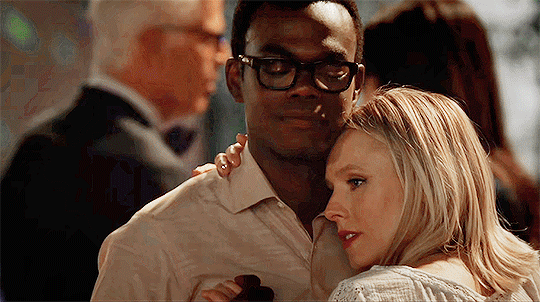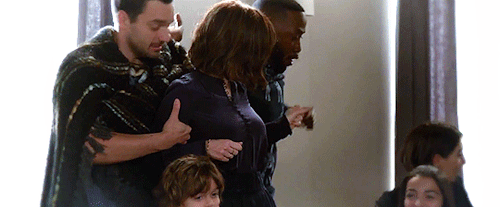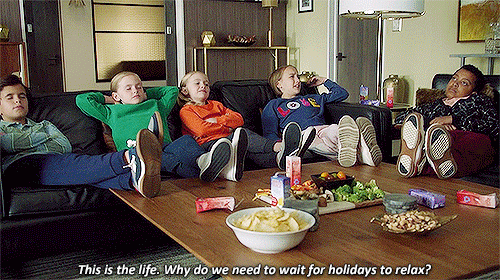I’m a sucker for TV comedies.
For a long time, I couldn’t even name five dramas I watched on a consistent basis. Life is often too dark, unpredictable, and disappointing and dramas just emphasized that. Comedies provide the sort of escapism and sweetness that we need in a world that is growing more and more heartbreaking by the day. Over the last few years, I’ve noticed a slight trend emerging in some of my favorite TV comedies: they feature the writing, EP, or other behind-the-scenes presence of either Mike Schur or J.J. Philbin.
Parks and Recreation was the comedy of optimism — a show defined by the love the characters had for each other (as well as their quirks). New Girl was a feel-good, slapstick show about friendship and relationships. Brooklyn Nine-Nine is an ensemble series that leans heavily into the theme of found family. Single Parents is a heartwarming, funny show about raising kids with the help of your “village,” and The Good Place is a wonderful gem of a comedy series raising big questions and providing even bigger payoff.
All of the series above have the influence of either Mike Schur or J.J. Philbin — who are, if you hadn’t already guessed it, married. So what is it that makes these two writers and creators so special? I think it’s their consistent drive to create content that is poignant, emotional, and uplifting.
TEAMWORK MAKES THE DREAM WORK
You’ll notice that each of the series I mentioned above is truly an ensemble sitcom. I love that Schur and Philbin have really brought their hearts and humor to this sub-genre. The Good Place is such a great example of this. It’s a show that hinges on some pretty big, deep concepts — the afterlife, philosophy, how to become a good person, theology, ethics. And yet, this is a comedy. Morality is a main character, but the true comedy and heart of the series comes from the interaction between Eleanor, Chidi, Tahani, Jason, Michael, and Janet. Mike Schur took a show whose primary concept is so deeply serious and turned it into a bright spot in the TV landscape. The writers and producers on The Good Place recognized that the show’s plot was the afterlife but its main purpose was to showcase real, flawed, funny human beings. When the show works well, it focuses on the hilarity that can ensue when we clash with each other because of our fundamentally different upbringings and wiring.
Ensemble comedies that are positive and hopeful focus on the ways we clash with each other, but ultimately, they work because they emphasize our similarities and love for each other. There are numerous comedies that forgo hopefulness in favor of cynicism, but honestly I feel like it’s important that Schur and Philbin don’t lean too heavily into the darkness; life is messy and broken but also there is good in the world. It’s nice to be reminded of that every once in a while, and it’s nice to be validated in celebrating the hope.
While all of the Schur/Philbin comedies are real (meaning that they deal with some heavy issues including, but not limited to, racial profiling, death, divorce, morality, etc.), they also allow us to remind ourselves of the good in humanity. Too much of life is centered on darkness. People can be cruel, and people can be awful. Bad things happen every single day. Comedies in the Schur/Philbin universe don’t willfully ignore the bad things. That would be absurd. Instead, they reframe the bad with a lens of goodness. What if there is, indeed, bad in the world? But what if there is also love? And friendship? And hope, against all odds? What if there is change and reform when the good guys win?
Just like Mike Schur enjoys ensemble comedies, so does J.J. Philbin. If you compare New Girl and Single Parents, you’ll find that both are ensemble series where the emphasis on “found family” (a theme that runs pretty heavily through Schur AND Philbin’s shows) means hilarious shenanigans, misunderstandings, fights, and ultimately support. In New Girl, Schmidt would annoy his roommates, act like a jerk, and yet eventually he’d recognize his wrongdoings and be forgiven. In Single Parents, Douglas is the seemingly curmudgeonly one of the parent group but has a soft heart. Both shows focus on characters who are optimists and some who are pessimists.
What makes these comedies so wonderful is that they have a balance of all kinds of characters. That leads to comedy, tension, and also a whole lot of silliness. New Girl and Single Parents operate on the same wavelength of comedy, focusing on how people can turn insignificant things into high-stakes shenanigans. Everyone has their quirks, and everyone has things that press their buttons. What makes comedy tick is the balance between individual storylines and overarching narratives.
Ensemble comedies are tough to navigate because, by their nature, they require focus on the group as a whole as well as dynamics between individual characters. But Schur and Philbin’s shows have always managed to strike that balance with relative ease. It’s impressive how well Parks and Recreation was executed, given the fact that there were ten major characters throughout the majority of the series to juggle. Single Parents is currently a cast of five adults and five children. But both shows manage to balance the important overarching story (the love these characters have for each other) with fun storytelling dynamics (personally I always loved the Ron/April stories in Parks and Rec, and I adore Will/Angie stories in Single Parents).
I’m consistently impressed by how well the shows in the Schur/Philbin universe make the characters their first priority. It’s something that makes their comedies so significant, memorable, and funny.

ROMANCE DOESN’T KILL COMEDY IN THE SCHUR/PHILBIN UNIVERSE
A lot of television creators have talked over the years about romance as it relates to their shows. (And, fun fact, so have I!)
In our digital era, “shipping” is more prevalent than ever and, unfortunately, a lot of writers decide to dangle will-they-won’t-they relationships with no intention of following through simply to bait their audience. They worry that putting a couple with romantic tension together will erase the excitement and comedy from their shows. But in trying to avoid romance, shows often stumble into the ironic problem that shows NEED romance to survive; to be fully alive and human means that you experience all ranges of emotions and feelings. It means you love, you lose, and sometimes you just have to talk about feelings.
What I’ve always admired about shows in the Schur/Philbin universe is that they don’t seem to view romance as a stumbling block or erasure of comedy. In fact, they seem to view it the exact opposite: as a way to make their shows more relatable and funny. A primary example of this is Ben and Leslie’s romance on Parks and Recreation. While the show wrote in tension between the two and threw obstacles in the way of them being together, once the show committed to the pairing, they did so wholeheartedly. There was no reason for the writers to try and tear the two apart anymore — the comedy from Ben and Leslie’s relationship didn’t derive from their demise; the show realized that the two were fundamentally different and therefore funny on their own.
There’s a difference between tension and denial, and when writers are in tune with the characters they create, romance can make shows better. The key takeaway is that part about understanding the characters though. A lot of showrunners and writers place their own desires above the needs of their characters. They forgo plot development and characterization, deciding to break up couples just because they’re bored or cannot find a creative way to keep the relationship interesting. And, unfortunately, that can lead to character assasination and a general demise. I’ve watched numerous shows succumb to these issues. But a show that never really did in the Philbin-verse is New Girl. While J.J. Philbin wasn’t the creator of New Girl, she was a writer and consulting producer for the series. From the beginning of the show, it was clear that there was some sort of romantic tension between Nick and Jess. But it wasn’t until season two that the writers acted on that tension, and the pair kissed in “Cooler,” then proceeded to date throughout the next season or so.
When Nick and Jess broke up in season three, many fans were concerned that criticism over the pairing’s focus, and the romance itself, “ruined” the series. While that was untrue, it wasn’t unheard of for writers and audience members alike to draw that kind of conclusion. Nick and Jess eventually reunited by the season six finale, and the significance of that is not lost on me. The writers didn’t reunite their couple immediately, instead giving them each the character growth necessary to become the kind of people who were ready for each other the second (and final) time around. New Girl did a fantastic job showcasing Jess pining for Nick — something usually reserved for male romantic leads — and it’s only because she acknowledged her feelings, processed them, and asked for help from her friends that she became a better version of Jessica Day. Nick, similarly, had to grow too; instead, he was grown through a relationship with someone else. He learned how to be a better boyfriend, and he learned to be a better best friend. If Nick and Jess hadn’t spent crucial time apart, they wouldn’t have been better together.
Nick and Jess didn’t break up for petty reasons, and the writers of the show didn’t separate them because romance kills comedy or dragged the show down.
Writers who understand their characters know that romance elevates the humanity of any comedy or drama, and good romance requires an acute understanding of the characters to work.

Mike Schur and J.J. Philbin both love the will-they-won’t-they pairings (Nick/Jess, Leslie/Ben, Jake/Amy, Will/Angie, Chidi/Eleanor, Schmidt/Cece), but you’ll notice that all of those pairings have one thing in common: the writers esteem the individual characters and they know great storytelling is built from organic conflict. Those characters clash even in love because some of them are idealists paired with realists or pessimists. Jake and Amy are seeming opposites, but they are both passionate people who express their passion in very different ways (shenanigans vs. structure). Will Cooper in Single Parents is the softest, most energetic person; Angie is tough and has trouble dealing with emotions.
Characters deserve to grow within romantic relationships on television shows. And one thing is sure: I’m incredibly grateful for the Schur and Philbin, because their shows are always willing to put in that work.
A NEW DECADE OF THE SCHUR/PHILBIN UNIVERSE
As we prepare to enter 2020 soon, I’m excited for more opportunities to watch Mike Schur and J.J. Philbin shine. They’re working on shows that are consistently highlighting optimism, friendship, and love. I feel like I say it every year, but life is dark; we need their comedy now more than ever. And what can we learn from these two executives and writers? We can learn that love is hard but it’s worth pursuing. We can learn that our coworkers can become our closest friends — and even our family.
And, finally, we can learn that life is messy, but it’s always and only better with others.







As you have discussed before, relationships don't have to kill shows, but the trap that the relationship "is" the show absolutely destroys a show once the relationship has changed, because most shows don't seem to get how the new dynamic can work.
ReplyDeleteSchur and Philbin have handled this as deftly as I have seen. It is one of my favorite parts of New Girl where they dived right into what it meant, and it is one of the least recognized qualities of Brooklyn 99, which is how they had the relationship arc, and then kept telling their stories without their relationship getting in the way. They didn't create hokey tensions or strange backstories to stop them. They just let them be and rolled with it.
I always think of Cheers when these things come up. Sam and Diane was amazing, Sam and Diane as a couple was a problem (for the way it was handled), and then once they were broken up, they changed the show so it could handle whatever state Sam/Diane/whoever was.
For their technical skill, and I think handling the "ships" is a skill, their ensemble approach is really my favorite quality. We all end up with a family we chose regardless of the family we are born with. In a world where it sometimes feels like no one can get to the Good Place, it is an optimism I admire and enjoy.
Thanks for the article. Well done!
Matt